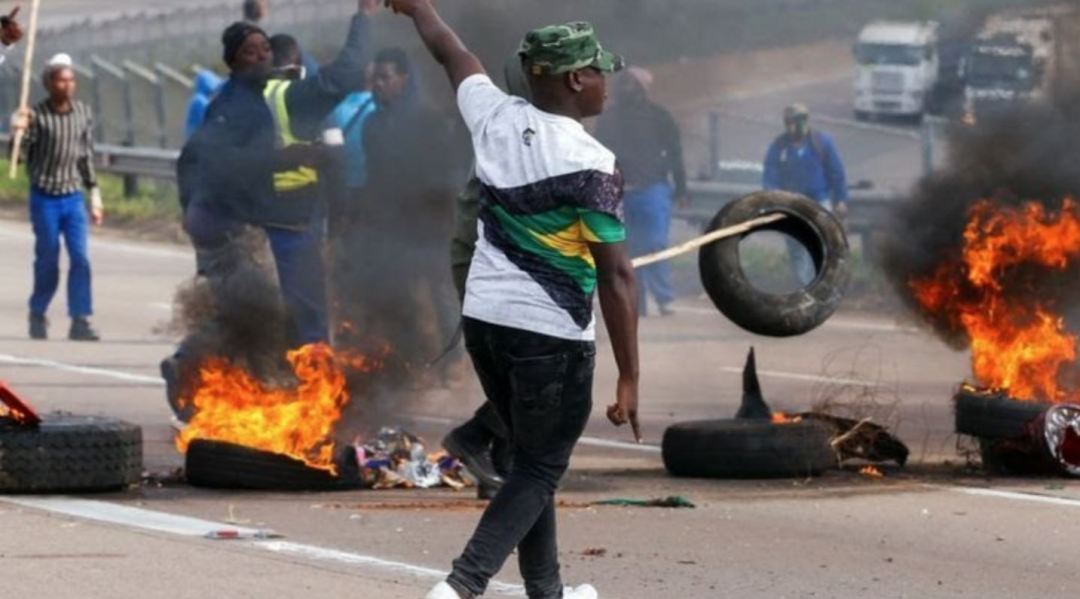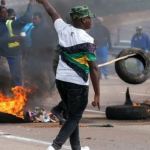
At least 117 people have died in riots and looting in South Africa’s Gauteng and KwaZulu-Natal provinces, and 1,478 people have been arrested, The Times reported. While looting continued in some areas, black, white, and Indian militias have largely restored calm to most communities in the Durban area (Gateway Pundit reported)
More…
TRENDING: LIVE STREAM VIDEO: Arizona Senate Hearing on Maricopa County Audit Results at 10 AM PT or 1 PM ET
People defending the looters as “protestors” gathered on Twitter under the hashtag #phoenixmassacre to accuse Indians of conducting a “race war” against black people in the heavily-Indian Durban and Phoenix area.
A thread pic.twitter.com/XQetxHbSBk
— Mr Libra (@Indigosera) July 15, 2021
In his speech to the nation on Monday, South African President Cyril Ramaphosa blamed “ethnic mobilization” among supporters of former President Jacob Zuma, many of whom are Zulu, for the worst unrest since the end of Apartheid in South Africa.
Opponents were quick to charge Ramaphosa with stoking ethnic tensions. “You don’t realize that this statement could potentially lead to a war amongst ethnic groups?” activist Mageba Zulu wrote on Twitter.
The Indian government expressed its concern over reports of violence against Indian-origin people in South Africa on Wednesday. Cyril Ramaphosa’s government assured Delhi “that the attacks were not racially motivated”, the Deccan Herald wrote.
“While anti-white racism has always been a perennial problem in South Africa, it is particularly stark for the people of Indian origin, who are targeted by a specific racist narrative related to broad perceptions of exploitation in terms of economic opportunities, political corruption, general lack of a socio-cultural ‘fit’ with the rest of South African society”, OP India wrote:
“With South Africa experiencing the worst violence in decades, Indians living in South Africa, too, have been at the receiving end of this unbridled bigotry. Consequently, Indians are facing racist abuse on social media platforms and the platforms are being used to further incite violence against Indians living in South Africa. Indians are being accused of racism in order to rationalise racist attacks against them.”
Farmer’s spokesman Theo de Jager warned white farmers of stoking ethnic tensions as well: “Confirmed information has been received that farmers will be provoked to shoot intruders on farms, to give a new race-based momentum to the current riot. Do not fall for it! Only shoot in self-defense! Farmers can not afford to become the focal point!”
NB!!
Daar is bevestigde inligting ontvang dat boere uitgelok gaan word om betreders op n plaas te skiet om n nuwe rasgebaseerde momentum aan die huidige oproer te gee. Moenie daarvoor val nie! Skiet net uit noodweer! Boere kan nie bekostig om die fokuspunt te word nie pic.twitter.com/RoBZUkVPFL— Theo de Jager (@TheoDJager) July 14, 2021
Security expert Frans Cronje of the Centre for Risk Analysis blamed the socialist and racialist policies of the Ramaphosa government for the violent outburst, calling Ramaphosa “a man completely out of his depth, with no idea what’s going on in the country, no sense of the extent to which the policies that his administration has pressed“ had contributed to the “powder keg” that is South Africa.
“Remember it is the Ramaphosa administration that hikes minimum wage levels, in the face of already massive youth unemployment”, Cronje said. The youth unemployment rate in South Africa is 64%, the general unemployment rate is 32%, the highest ever.
Cronje also blamed the drive for land expropriation without compensation from white farmers. “The government maintains that its economic recovery strategy with be premised on an expropriation strategy. It’s moronic, frankly!”
“Then to press ahead with racial nationalist rhetoric and the ratcheting up of the race-based Empowerment criteria (South Africa’s Affirmative Action), which anyone with experience of the South African economy knows is a conduit for corruption and a tax on investment.”
Critics charge the country’s Broad-Based Black Economic Empowerment laws, which require companies to seek black co-owners, often from the ranks of ANC leaders, only benefit party hacks and do not help poor blacks. Indeed, many ANC leaders such as Jacob Zuma and Cyril Ramaphosa have become fantastically wealthy off their co-ownership of major companies. Forbes estimates Ramaphosa’s fortune at ¢450 million, who began as a modest union organizer.
The current blowup “is a consequence of the policies of the present administration”, Cronje said. The greatest risks now are “a copycat effect”, of the riots and looting spreading to other areas of South Africa.
The second risk is that “of a second Marikana”, Cronje said, referring to the 2012 miner’s strike in which police opened fire on protesting miners, killing 34 of them. Cyril Ramaphosa was a non-executive director of the mining company at the time and pressed police for “concomitant action” against the miners, who he referred to as “plainly dastardly criminals”.
The current deployment of the army, which Cronje called “absolutely necessary”, raised the spectre of “a second Marikana”, with the police being overwhelmed, running away and turning security over civilian militias, to in one case even “begged private people for ammunition.” A violent confrontation with the Army would create “the context for a national uprising against the government.”
“If those two events, the xenophobic pogroms and the national uprising, can be avoided, then this thing calms over the next two weeks, but in calms back to that same level of violent, anarchic protest action” that had already become the norm, Cronje said. “The government is speaking about a return to peace an law and order. There hasn’t been that in South Africa for years.” Absent serious reforms, Cronje predicted “the ANC’s time in government in South Africa is reaching the end.”
“More than 26 years since the end of apartheid, the country continues to remain marred with the scourge of racism”, OP India observed. “The oppressor and the oppressed simply appear to have swapped places.”
#SouthAfrica Inside one of the biggest warehouses in South Africa, that’s been looted during violent protests. This is Value Logistics in Cato Ridge near the N3 freeway between Inchanga & Durban. It supplies major food, electrical and furniture outlets in the country. #eNCA pic.twitter.com/OonVGGLFSS
— Siphamandla Goge (@SiphamandlaGoge) July 15, 2021
Tensions are growing in KwaZulu-Natal as looting of factories and public unrest continues. Over 72 people have been reported dead and at least 1,700 people have been arrested so far. eNCA’s @DasenThathiah is coming to us live from the sky to give us an update. #DStv403 pic.twitter.com/UiwZP4Wxkh
— eNCA (@eNCA) July 15, 2021
These gentlemen drove from Azaadville in #JHB to #Durban with their own trucks & security, carrying 32,000 loaves of bread for distribution!!!
May you forever be blessed! 🤲🏽 🙏🏽 source from South African Indian Facebook account. #ProtectSouthAfrica #UniteSouthAfrica #LoveIndians pic.twitter.com/COesbPz5R4
— Hassan Abdullahi Aalim (@Hamaalin) July 15, 2021







